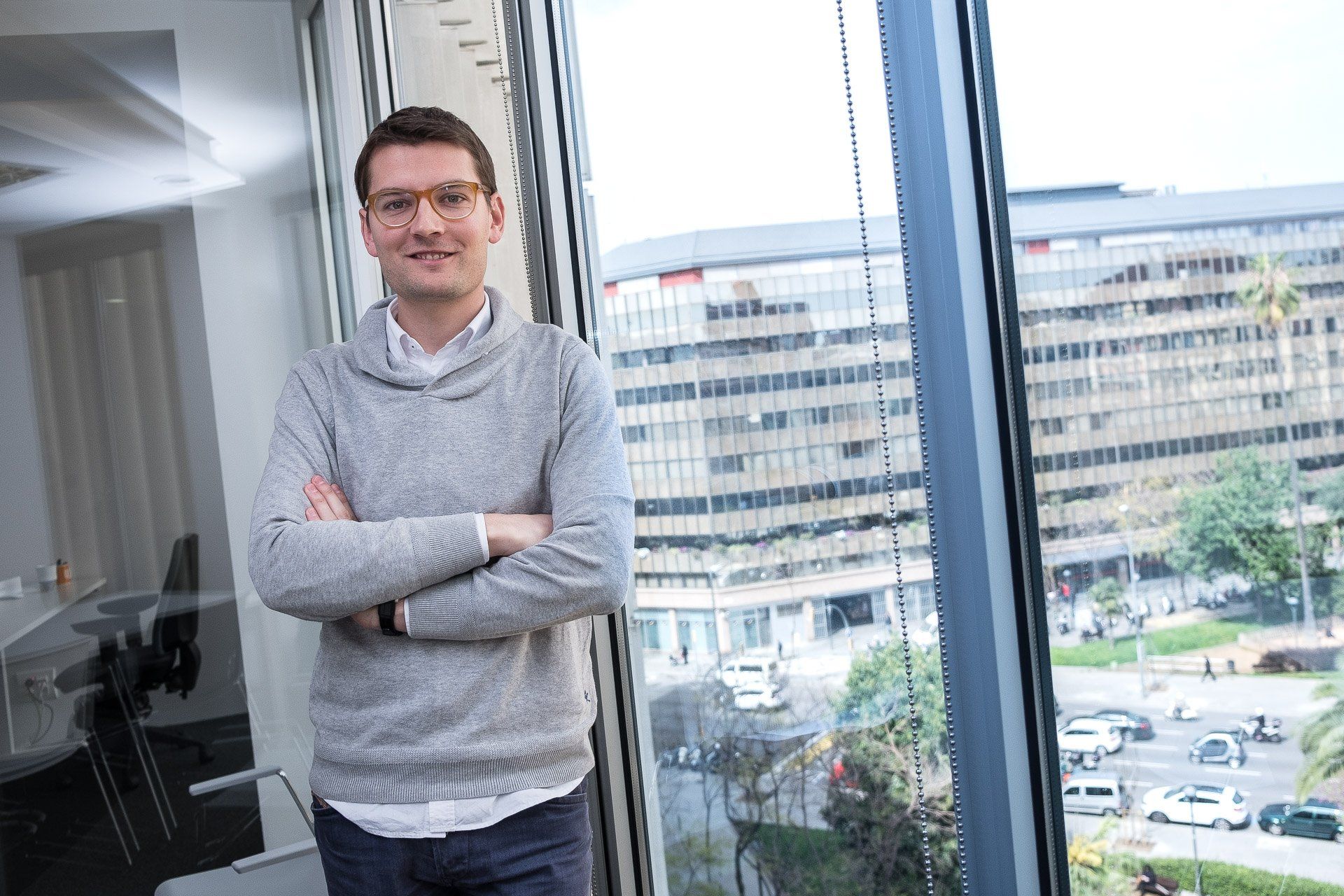
He believes in his product, which he has been developing since the beginning. JaumeBetrian, Catalan entrepreneur, with trainers and shirt in the purest casual business style, is one of the brains behind Ofertia.com, the Catalan website (even though it is almost German since Bonial acquired 64% of the company) that has offers from different shops near to where the user may be located.
The firm that began in 2012 in Barcelona has a turnover of three million euros and grew by 40% last year, which the company announced on Tuesday. "We are profitable in Spain and we will also be so in the countries in which we are growing. We have shown ourselves capable, which means we are no longer a start-up," he says confidently.
What made you begin Ofertia.com?
In part it was very personal, from my own experience. I worked in large-scale marketing before -I worked for Kraft for a number of years. As a brand manager for one of the biscuit lines I was responsible for investment in marketing and one of the budgets went to paying large chains to allow us to take advantage of promotions such as 2x1 or buy one get another at half price, and so on, which included being in the paper catalogue. We knew the print run but we didn't know how many reached customers, how many were left on the street or how many ended up in shops.
So what is the history of the entrepreneur behind Ofertia.com?
I left the large company to do an MBA at IESE with a very clear idea that doing two years full-time, apart from learning a great deal and meeting a lot of people –which really was like that because there I met my other cofounders- I hoped I would have time to think and develop a more concrete idea, to begin presenting it to clients, users and investors. We were interested in starting a business but we did not know what the idea would be. In fact, Ofertia was one of the ideas I shared at the beginning with those who would later become my business partners. At eight in the morning before starting classes, we brainstormed ideas and evaluated the potential for the ideas in order to rule them out. During the summer of the first year, we decided to set up the company, with advice from teachers, speakers, etc. There were a thousand opportunities! During the summer we worked from Oriol's (Carreras) dining room. It was a little surreal. Our first employee called his wife after an hour to assure her that this was a normal job.
The initial funding came from among the founders, as I understand it.
Yes, we funded the whole thing with our savings: some 50,000 euros. We had no salary until after leaving IESE, when we achieved the first round of investment, in which Bonial already took part. These first six months were a period for developing the technology and attracting capital with something we could show. And we raised capital from day one, a job that I think never ends. You are constantly at the stage of raising capital because if you go to sleep, the accounts are what matter and you can find yourself in difficult situations. .
 |
| Photo: Jordi Borràs |
Since that first employee, you now have 65. Do you find it hard to find talent in Barcelona?
It is very difficult, even in Barcelona, both because it is becoming an entrepreneurial and digital hub and because it has universities with influence in the technical sphere. Barcelona has a talent pool that is without doubt better than what you can find in other Spanish cities, but the problem is that it is also where most companies are investing and looking for people with these profiles and so, although there are jobs to be had, the demand always outstrips supply. Clearly if I had a child, I would tell him or her: "if you want to find a sector that truly has a future, technology and data analysis are sectors that will always be looking for people." The digital economy is the new major sector, and it could become a driver of sectors in the country's economy now that we have realised that bricks and mortar and property speculation are things that bring no value and that are not sustainable in the mid-to-long term, while the knowledge industry, that of data and new technology are. As a developed country we should opt for these 100%.
How do you compete with other firms?
There are a lot of other international companies that see Barcelona's attractions and that are opening development centres here with financial and working conditions that are very much in the American style, which for start-ups without resources it makes it even more difficult to compete. In the area of salaries and intangible remuneration, we have a super complete programme: for us the talent and the team are the most important asset that makes all the difference. But when that super Nordic company comes and sets up a centre, it takes on 200 at once, or when Nestlé announces it is making a hub in Esplugues, Ocado taking on between 200 and 400 programmers... Obviously, things are heating up a lot.
But does that bother you or encourage you? It is enough to make you think "we are where we have to be", isn't it?
It is double-edged sword. It encourages us because you have to be where things are happening and here they are happening, both in our sector as well as in our city and we also love that. Firstly, because we are here and, secondly, because we like to see how the ecosystem we have contributed to in the past four years is developing. Now it seems that we are not the only ones, now the large ones –who are the first to take notice: if start-ups fail, they do not invest and if they are successful, they start investing- it seems are coming in and attracting new talent here. It is also true that the quality of life in the city, given our geographical situation, is very similar to the technology Mecca that is Silicon Valley and we have to take advantage of that. Yet, what's more, the cost of living and the level of salaries, although rising, make us competitive compared to Berlin or London.
 |
| Photo: Jordi Borràs |
You call yourselves a start-up, but at what point as a start-up do you start saying "we are now a company?"
We have been a company since the first day, but we have not lost the start-up spirit in the sense that we continue to keep things as lean as possible with the least red tape and redundancy of processes, while being technologically and economically efficient. And so we always have this innovative spirit, anyone on our team can contribute the next great innovation; it does not have to go from top to bottom, but rather the flow of innovation is across the company. We try to stay very close and I think that is what the start-up spirit means. It is true that the number of employees, according to our growth, the level of investment, turnover and the years we have been working, would make us more of a growth company than a start-up.
You operate in different countries and, therefore, have different users. Are Spanish users very different from Mexicans, for example? And what about Catalans compared with the rest of Spain?
The smartphone in Spain is homogeneous: they are more urban, as Barcelona and Madrid have a great presence and also large cities like Valencia or Seville. In Latin America, users are similar to those in Spain but the level of development of e-commerce is different, because there the fear about buying online is a lot higher, logistics is worse because there is a lot of fraud, etc. And that tells you clearly which stage it is at, the level of use, etc. However, smartphone penetration in Spain stands at 80% while in Mexico it is 54%, which is not bad, and it is growing at a good rate and, therefore, in absolute numbers Mexico is one of the biggest opportunities. In these countries, the behaviour of users is more intense than in Spain and where the clients are concerned the education that has to be done is also greater because the investment in digital media is not so developed.
Won't you end up turning to e-commerce as well? Wouldn't it be a challenge?
We already make the link with e-commerce. As a client, if you want this link to lead to a product, the possibility exists, but what we find is that the user wants to see the availability in shops and in most cases ends up buying in the shop. Online food sales make up 2% of all sales in the food sector, it is growing at an annual rate of 20%, which is a lot but with this base it is only 0.4% and for it to become meaningful 30 years would have to go by. In the short term, I do not see us transforming ourselves, but we will have it as a complement as the user is increasingly using multichannels. One day I will go to the shop and buy there because it is quicker or more practical, while on another day I will buy online. Our main aim is for it not to become a question of either e-commerce or just in the shop, but rather one has to think about the individual consumer, because the easier we make it for the user, the easier it will be for us.